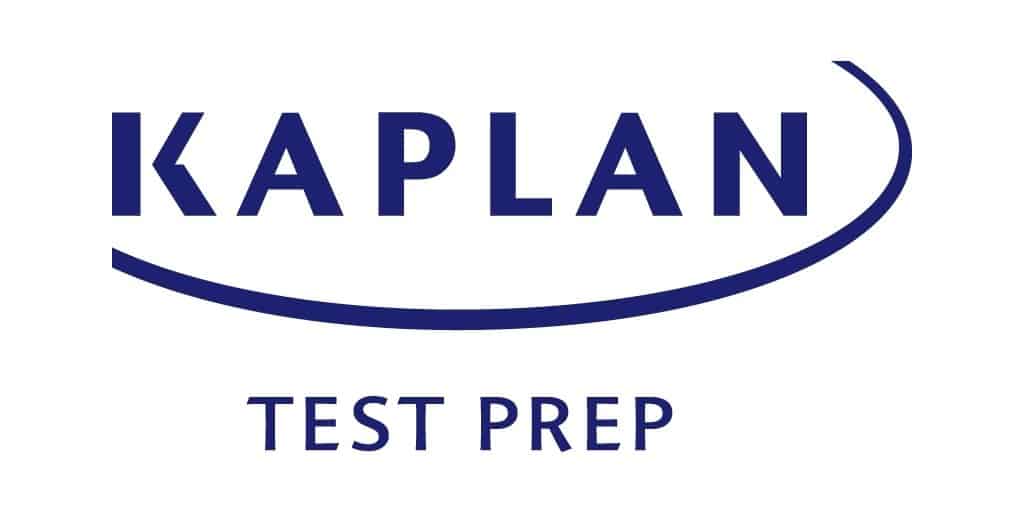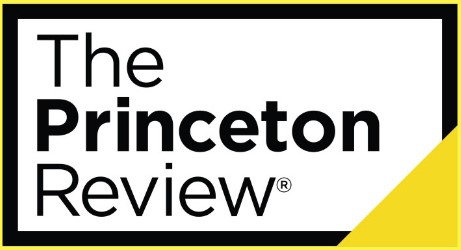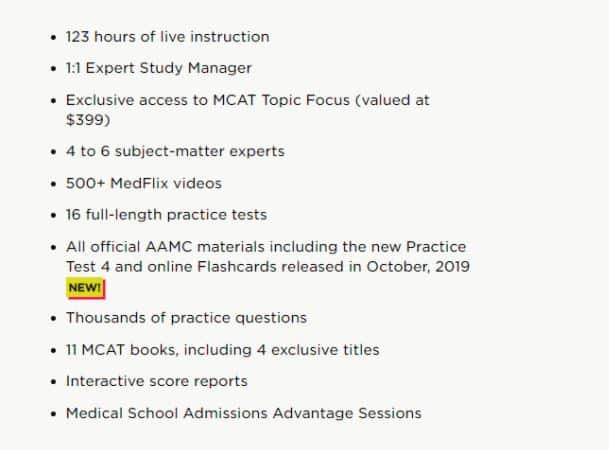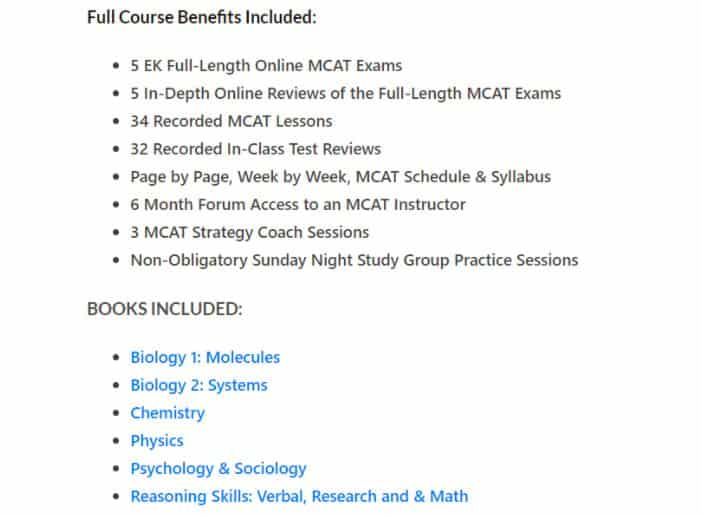Kaplan vs The Princeton Review vs Examkrackers MCAT Prep Course 2023
Prep course giants Kaplan and The Princeton Review (TPR) stand at the forefront of MCAT for many medical students.
Today, we add another solid prep course to the list: Examkrackers, a prep course that receives a mix of both praise and complaints about its program offers, content review, and pricing.
Kaplan vs. Examkrackers vs. The Princeton Review MCAT 2020: Effectiveness
Before we can decide which is the most effective study plan, it’s important to discuss the key elements each prep course has to offer.
Below is an outline of differences between the three prep course:
|
Kaplan |
Examkrackers |
Princeton Review |
|
|
Score Guarantee |
Yes; Higher Score Guarantee: if you did not score higher than your baseline score |
None |
Yes; 510+ Score Guarantee |
|
Books |
8 subject review books |
7 subject review books |
11 subject review books |
|
Prep Course Offers |
Self-study, Live online, and In-person |
Self-study and Live online |
Self-study, Live online, and In-person |
|
Tutor Program |
Yes |
Yes |
Yes |
|
Practice Tests |
16 full-length practice tests |
5 full-length practice tests |
16 full-length practice tests |
|
Live instruction Hours |
700 hours of live instruction and practice |
34 recorded MCAT lessons and 32 recorded In-Class test reviews |
123 hours of live instruction and practice |
|
Course Access |
5 months |
3 months |
9 months |
|
Personalized Study Plan |
Yes |
No, but provides MCAT schedule and syllabus |
Yes |
|
Number of Hours for Interactive Video Lessons |
130 interactive science review videos |
Not Specified |
500+ MedFlix videos |
|
Number of practice questions & passages |
10,000 |
5,500 |
Thousands of practice questions |
|
AAMC Content Material Access |
Yes |
No |
Yes |
|
Additional Resources |
Qbank, Flashcards, Great visual representation in subject review books |
6-month forum access to an MCAT instructor, 3 MCAT strategy coach sessions, 5 in-depth reviews of full-length exams |
4 to 6 subject-matter experts, MedFlix videos, Medical School Admissions Advantage Sessions |
|
Price |
Expensive; $1,799 – $6,999 |
Expensive but cheapest compared to Kaplan or Princeton Review MCAT; $1,299 – $1,745 |
Expensive and similar to Kaplan’s pricing; $1,699 – $6,999 |
Now, let’s discuss each prep course in detail.
Students enjoy using Kaplan as an MCAT reviewer for 3 key reasons:
-
Kaplan’s QBank is a personalization feature that stands out in Kaplan’s e-learning platform. You can edit the test style (time, untimed, or none), select specific topics, create a test name for better referencing, and choose to recycle previous questions or not. Using the Qbank provides feedback and an assessment of your strengths and weaknesses to improve your MCAT score and performance.
-
MCAT Channel provides students with the option to learn in the comfort of their own homes and at their own pace. Students will have access to both live and pre-recorded lectures that they can view at any time. The MCAT channel is an invaluable resource for those who prefer to self-study for the MCAT.
Instructor Guidance is Kaplan’s tutor program that is on par with Princeton Review. Its instructors provide a solid 1-on-1 learning experience that helps students tackle fundamental MCAT topics.
As for Princeton Review, its historical ratings, student feedback, and program inclusions prove why it is a popular choice.
- 510+ Score Guarantee Program appeals to many students as this means a higher acceptance rate. However, only less than 2% of students who enrolled in this program asked for their money back, which is proof of the course’s efficacy. Many students who enrolled also reveal a high satisfaction rate in the learning tools, resources, and instructors of the program.
- Subject Review Books are what The Princeton Review has plenty of. Does quantity mean it’s also better quality? In Princeton Review’s case, their books provide a more in-depth read and a deeper content review against Kaplan and Examkrackers. Students with strong pre-MCAT topic backgrounds will love the subject review books provided by Princeton Review.
Now, Examkrackers may not be as famous as Kaplan or The Princeton Review MCAT prep courses yet students claim it to be a lifesaver, especially in dire situations.
-
Practice Exams from Examkrackers excel in terms of critical reasoning. The MCAT isn’t only a memorization and concept application. At least 20%-30% of the exam will need critical reasoning skills and Examkrackers does a good job in helping students improve in this area effectively.
-
Enthusiastic Learning describes the unique approach that this prep course implements in teaching its students: humor. For students that easily get bored when studying, humor can definitely help fuel drive and memory retention.
-
Designed for shorter prep-time as explanations in practice exams are concise and provide a solid takeaway. If you only have two months or less to study for the MCAT, Examkrackers will be your redemption.
The Most Effective Prep Course Is…
Kaplan.
It takes the crown in being effective and in providing a diverse selection of resources in their online platform for its students to use. The live online prep course is fantastic, thanks to the MCAT channel and the instructors who possess great mentoring skills.
Between Kaplan or Examkrackers or Princeton Review, Kaplan is a champion in allowing students to adapt to different learning styles and even combine their study approach like self-study + online learning.
Be that as it may, Examkrackers and Princeton Review are effective courses in itself and still hold a lot of credibility and reliability in their program offer.
Comparing What Each Prep Course Has to Offer
In this section, we’ll take a look at the top 5 factors that contribute to the overall effectiveness of any prep course program.
- Practice Exams
- Pricing
- Program Offer
- Books
- Added Resources
These factors also represent critical elements and resources that medical students look for before deciding on a prep course that suits their needs best.
1. Kaplan vs. The Princeton Review vs. Examkrackers: Practice Exams
Kaplan
Kaplan offers 16 full-length practice exams with most practice questions following a pseudo-discrete question format. This means the questions focus more on content knowledge rather than critical thinking.
Where Kaplan excelled in the practice exams, it failed in the scoring system, which is lacking compared to the actual MCAT scoring system. Nonetheless, it’s the MCAT prep course that will help build your stamina, develop proper pacing when answering the test, and identify any knowledge gaps.
The Princeton Review
It offers the same quantity of full-length practice exams as Kaplan’s but many students complain that the questions are poorly written, confusing, and, at times, incorrect. This doesn’t mean Princeton Review’s exams are completely bad, just that they’re geared for students who have solid knowledge on the MCAT topics already.
Examkrackers
Examkrackers outperforms Kaplan and The Princeton Review in regards to the question format and experimental design. The quantity though is limited.
The Psychology and Sociology test sections are well-praised by many users. Most of all, their practice exams focus more on critical thinking skills, which is essential in the MCAT exam. One of the strengths of this prep course is its ability to help you work through problems efficiently and quickly.
Verdict:
Winner: Examkrackers.
Using Examkrackers practice exams builds critical reasoning skills that are more essential for the MCAT exam. As for The Princeton Review MCAT vs. Kaplan, the former has the lowest rating, while the latter is considered as a slightly better option.
2. Kaplan vs. The Princeton Review vs. Examkrackers: Pricing
Kaplan
Being an industry prep course leader for more than 30+ years, Kaplan’s pricing is at a premium level and doesn’t come cheap. Fortunately, going for its course program isn’t the only option on the table.
You can opt for complementary packages like the QBank, practice test bundles, and a DIY course that’s cheaper than the premium courses offered. Kaplan’s pricing for the prep course ranges from $1,799 to $2,999. The boot camp 5-week prep course costs as high as $6,499.
The Princeton Review
TPR also offers price levels close to what Kaplan offers its students but it lacks the complementary packages that Kaplan offers. However, in regard to the number of books and value received from the program, TPR makes up quite well despite its steep price.
In addition, Princeton Review’s tutoring packages are far better than Kaplan’s.
TPR’s pricing ranges from $1,699 to $2,999 and can go as high as $6,499 for their summer immersion program. Overall, it’s the priciest prep course on this list.
Examkrackers
Examkrackers considerably priced its program to a level almost similar to Kaplan and Princeton Review.
The only difference? Examkrackers offers half the quantity of resources Kaplan and TPR offers.
What’s worth noting though is that smaller packages at much lower prices are available. The 5-practice test bundle, for instance, is only $50.
Examkrackers doesn’t offer as many options as Kaplan or TPR, such as live online, self-paced, online, and tutoring options. What it does offer are self-study and online options. These come at a steep price, however, starting at $1,299 for 10 weeks and $1,799 for the self-study option.
Verdict.
Winner: Kaplan. All three prep courses land a steep price but in terms of value, Kaplan provides an extensive resource base to online and assessment tools.
3. Kaplan vs. The Princeton Review vs. Examkrackers: Program Offer
Kaplan
Source: ww2.kaptest.com
Kaplan provides an extensive program for its students. Not to mention, the number of its practice exams, an MCAT channel, Qbank access (1), and 7 subject review books.
Kaplan also provides one of the best instructor guides. This makes its live online class a noteworthy prep course for students who want a balance between self-paced and tutoring.
The Princeton Review
Princeton Review’s program is even far more extensive. The hours of live instruction clearly demonstrate dominance in the live online prep course. Its subject review books also come in with the most quantity.
Let’s also not forget the 510+ program (2) TPR offers its students. It’s a prep course well deserved of respect and quality.
Examkrackers
Examkrackers barely compares with TPR and Kaplan in terms of the course programs and resources. It only offers half of the resources that both ed-tech giants provide but at a steep price.
The Examkrackers program, however, holds a strong case for concise explanations and great visualizations in its books. However, it lacks the quantity of prep course materials that Kaplan and The Princeton Review offer in generous amounts.
Verdict:
Winner: Princeton Review. It’s hard to say no to 11 subject review books and a guaranteed 510+ score. This gives students more confidence in enrolling in the program overall. Between Kaplan vs. Examkrackers MCAT 2020 prep course, Kaplan takes second place for its wide resource base.
Kaplan vs. The Princeton Review vs. Examkrackers: Books
Kaplan
Kaplan’s books provide a lot of visualization for explaining concepts. It simplifies complicated lessons and concepts to an understandable and digestible level. What’s great about these books is the number of practice questions at the end of each section. The price value is also a solid bargain.
A drawback of Kaplan’s books is that there is a lot to read. Perhaps around 200-300 pages at most. Also, Kaplan’s psychology and sociology books aren’t as strong.
Kaplan has a 2020-2021 reviewer for the MCAT, which is described to have the latest and most testable MCAT materials. You might want to consider this resource to get more updated information for your next MCAT.
The Princeton Review
Source: www.princetonreview.com
With 11 subject review books, it’s no wonder TPR has gained so much popularity for its program over the years. Its books offer a lot of information.
This might be a drawback for some, however. While the content is indeed comprehensive, there’s also a lot of information you read that doesn’t appear in the MCAT.
If you can afford it, we highly recommend that you get the MCAT Subject Review Complete Box Set that includes plenty of practice tests, 3 of which are done online, and 7 complete subject guides. This set is also ideal for someone who still needs a lot of reviewing to do.
Otherwise, settle for the all-in-one resource, The Princeton Review MCAT, which covers test essentials and subject reviews that are presented topic by topic.
Examkrackers
Source: examkrackers.com
What Examkrackers offers in its books are visualization and conciseness. This makes it relatively an easier read and is actually the reason why it’s perfect if you’re short on time.
In spite of the concise delivery, users feel they could use a little more comprehension. This leads students to even look-up for extra information online to understand the topics more.
Its complete study package 11th edition isn’t half-bad and does quite well, especially in laboratory techniques. Biochemistry and psychology though are the weakest areas in their books.
Verdict:
Winner: Kaplan. Yes, you’ll read more pages compared to the books from Examkrackers or TPR, but you’ll also understand complex concepts easily, which is essential to your MCAT performance.
Kaplan provides the most number of practice questions at the end of each section. Moreover, what you read in Kaplan’s books is closely related to what appears on the MCAT.
Kaplan vs. The Princeton Review vs. Examkrackers: Additional Resources
Kaplan
Kaplan offers a QBank with over 2,300 questions to practice from, 130 interactive videos on their MCAT channel, and the flashcards app for improving conceptual knowledge.
In terms of quantity, Kaplan is without a doubt a champion in this area.
A drawback of the Qbank though is that the practice questions tend to be repetitive, and the online platform can be overwhelming to use.
The Princeton Review
If this review happened 3 years ago, I would have said TPR to be on the losing end; however, TPR has upped its game recently.
TPR now has a Qbank with over 2,700 questions and, although its flashcards app is buggy, it remains high quality.
In addition, TPR recently introduced its Medical School Admissions Advantage Sessions, which helps students through their medical school application.
Examkrackers
Examkrackers is famous for their 101 MCAT passages (3) and 1001 MCAT questions, which are resources to help your test-taking abilities and aptitude. It doesn’t offer online tools like Kaplan or Princeton Review does; however, their 1001 MCAT questions book is definitely worth buying.
Verdict:
Winner: Princeton Review. If this were a battle of quantity, Kaplan would’ve reigned champion. When it comes to the MCAT though, quality is far more critical.
What is the Best Prep Course?
Choose Kaplan if:
- You want a thorough review of verbal reasoning, physics, and organic chemistry
- You prefer a traditional classroom learning experience
- You need a good mentorship program
- You require improving in the MCAT pre-requisites, basics, and fundamentals
Choose The Princeton Review if:
- You have a strong MCAT pre-requisite background and want to dive deeper into more lessons
- You prefer tutoring or live online learning experience
- You’re looking to maximize your score and enroll in 510+ program
Choose Examkrackers if:
- You want to build your critical thinking skills for the exam
- You’re short on time and have between 1.5 to 2 months to study
Frequently Asked Questions
Bottom Line
When it comes to choosing the right prep course, it boils down to evaluating your weak points, your needs, budget, and what learning style works best for you.
No prep course is perfect; however, they’re perfect in serving the right needs. Not all students have the same needs and weak points. Take a diagnostic exam, plan your schedule, and ask yourself how you learn best.
References
- https://ww2.kaptest.com/mcat/practice/mcat-prep-qbank
- https://www.princetonreview.com/medical/mcat-guarantee
- https://examkrackers.com/shop/







